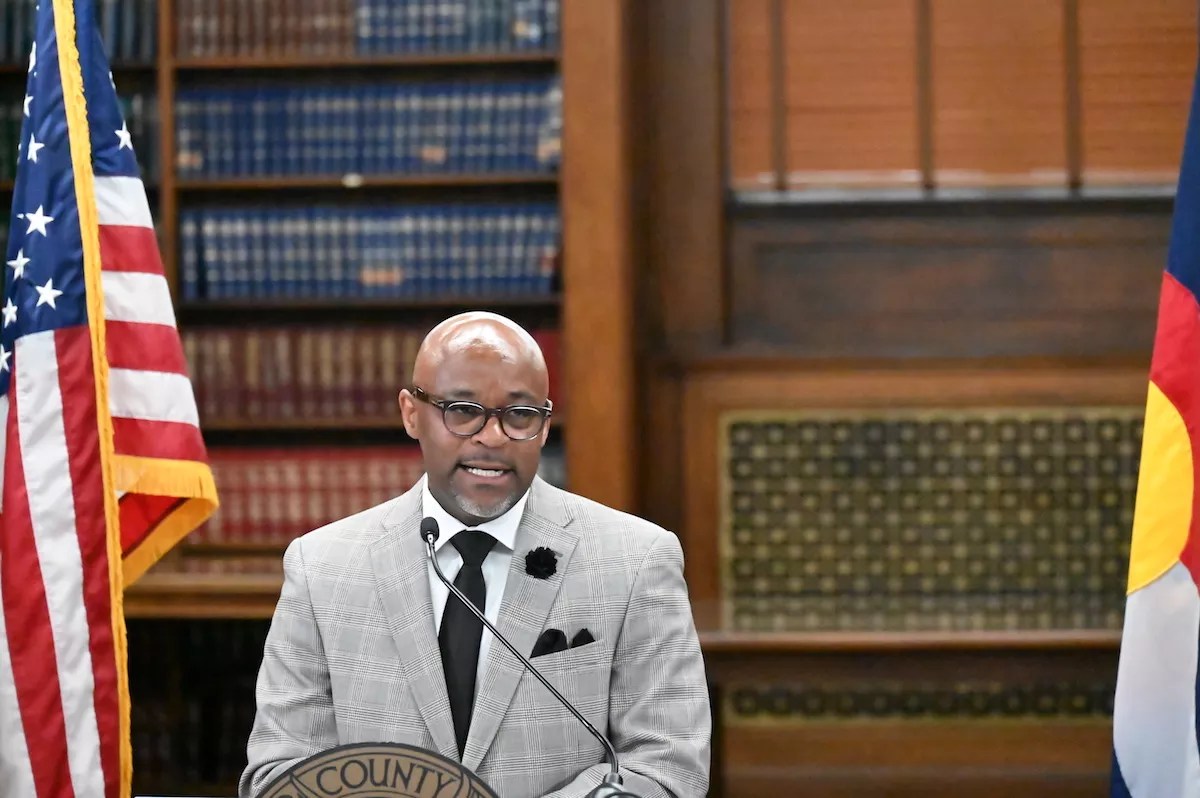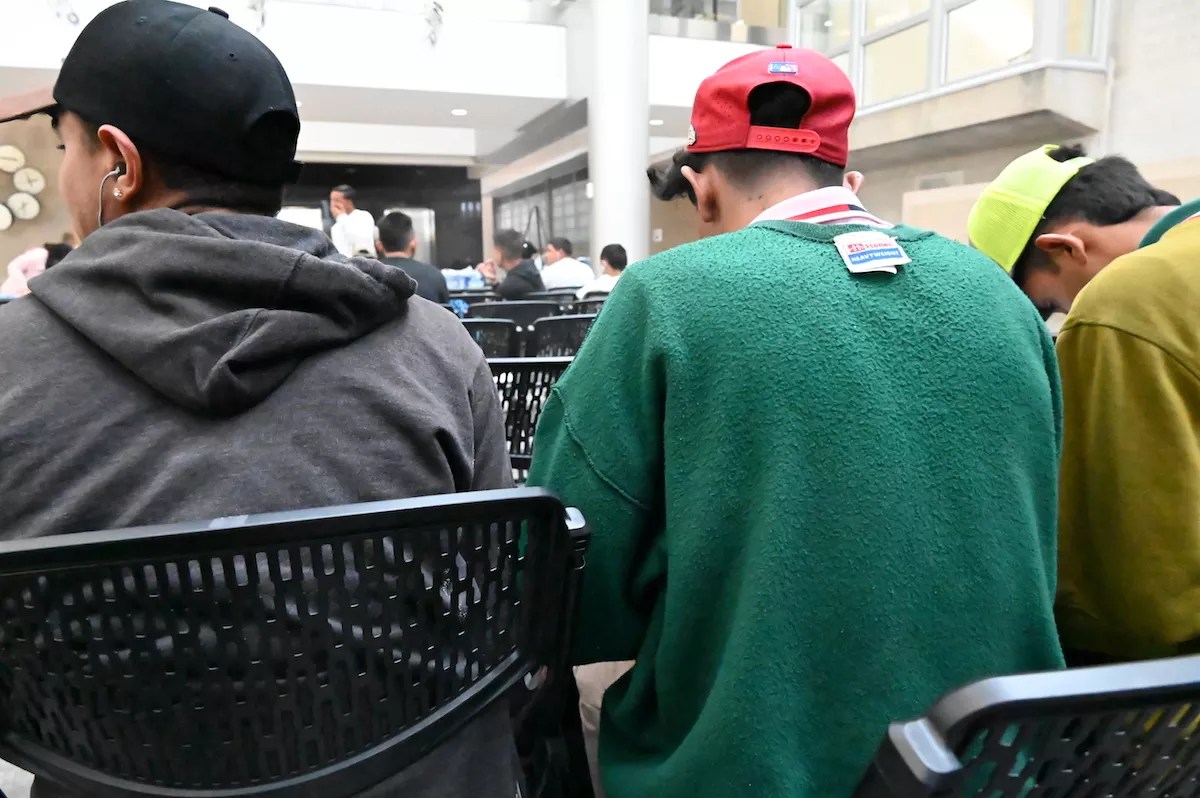
Bennito L. Kelty

Audio By Carbonatix
Dealing with an influx of migrants, Mayor Michael Hancock says that the city will start using its own facilities to process the hundreds of new arrivals that keep pouring daily from the southern border after many started hunkering down in an Auraria campus parking garage last weekend.
The move came on May 11, just as Title 42, a pandemic-era border policy that had been sending migrants away from the Mile High City and the U.S. as a whole, was set to expire.
“We are in a state of emergency. We are in a state of crisis, as well,” Hancock told reporters. “This influx that’s happening this week is completely unexpected. I don’t think any city expected it.”
Nearly 10,000 migrants have come to Denver during the past five months, Hancock said – not to mention the “155,000 souls standing at the border right now.” The most recent update by the city reports that at least 105 arrived on May 11 and 286 the day before. And that’s after nearly 530 arrived last weekend, when Auraria’s 5th Street Garage was already overrun by migrants waiting for help.
Many came because they knew the city would help them get to another location, according to migrants who spoke with Westword. They said they were steered here “by word of mouth” from fellow migrants they met on buses and in shelters around El Paso; they’ve been sold on the idea that Denver will provide free transportation.
According to Hancock, the City of Denver knew Title 42 was going to expire on May 11, and “conventional wisdom said we were going to see an influx in June.” But the surge has come much sooner.
Under Title 42, migrants were not able to seek asylum in the U.S.; the policy also allowed border officials to turn migrants back across the southern border to fight the spread of COVID-19. The policy lasted about three years, but it expired when President Joe Biden ended the federal pandemic emergency at midnight – allowing more migrants to stay instead of being turned away.
Hancock said he’s been in talks with mayors from border cities about policies that have worked for handling the sudden influx “in the most compassionate and humane way possible.” However, none of the mayors he talked to expected a surge like this.
“There are few cities in the country that are as prepared as you would expect us to be for this sort of thing,” Hancock said. “I don’t know what perfection looks like in a humanitarian crisis. It doesn’t exist. You try to respond the best you can.”

Miguel Alvares and two friends to his left sit in Denver’s new migrant intake center and wait for their tickets to a second location to print.
Bennito L. Kelty
Denver wants the exact location of the new intake center to be kept secret to protect the migrants there. It opened on May 11, and city officials say that it will only be open from 8 a.m. to 5 p.m.
Migrants can go to the intake center to receive either shelter in Denver or transportation to wherever they need to go. About fifty migrants were waiting at the new intake center on Thursday morning, sitting in one of two sections: one for those traveling and the other for those staying in Denver.
Those who can’t get processed before the intake center closes at 5 p.m will get shelter, city officials say, even though all city-owned and partner shelters are already housing hundreds of migrants.
On May 11, the city reported that 148 migrants were housed in the five city-run shelters that Denver both owns and leases. Another 878 are staying at partner shelters run by groups helping the city.
Hancock, now in his final two months as mayor, is aware that many Denver residents are also living on the streets and insisted that “we will never stop working to serve those who are experiencing homelessness.”
“We have a system. We invested over $254 million this (fiscal) year on our efforts for affordable housing. We will not disrupt those strategies to care for those who are on our streets,” he said. “Our goal every day is to get them off the streets. The goal every day is to connect them to the proper services.”
Luis Alvarado, a migrant who walked from Venezuela to the border city of Brownsville, Texas, plans to stay in Denver – first in public housing, and then with his cousin and her husband, who are housing six other people. He traveled alone, leaving his wife and three children back in Venezuela, and he hopes to work while in Denver so he can send money back to them and one day reunite with them.
Like other migrants, he says he was robbed and threatened in countries like Panama, Guatemala and Mexico – and has had “the best treatment in the U.S.”

A sign on the side of a chair in Denver’s emergency migrant intake center reads “Viajando” (“Traveling”) to separate those who are staying in Denver from those who are going to another location.
Bennito L. Kelty
“The rest of Latin America – not even Mexico or anywhere over there – the people aren’t so nice,” Alvarado says. Like others, though, he praised the treatment he received in Honduras, noting that “they have a high level of care” for passing migrants.
Wuenyer Carreño, who worked in construction in Venezuela, says he left that country because the economy is bad and because of repression by dictator Nicolás Maduro. He stopped in Denver on his way to New York, where he expects to be reunited with his wife and four daughters.
Carreño says that in Panama, “people are robbed and some of the women are raped.” In Guatemala, “the police are very bad and rob people.” And in Mexico, “the cartels kidnap migrants and try to rob them.”
However, the treatment he has received in the U.S. “has been very kind. The people here are very nice and helpful. I’m very thankful.”
Selis Hernandez and her husband, Jose Lopez, owned a bodega in Venezuela but left with their three daughters because of “threats of extortion” by “armed men,” who threatened to kidnap them if they didn’t pay up.
In Panama, gangs threatened to rape his wife, Lopez says; the police robbed them in Guatemala, and they had to escape cartels in Mexico. The U.S. “was like another world,” he adds.
“Everything changes once we got here,” Lopez says. “The people here have been very good to us. People came to us, offered to help, offered us food. Most of the people we’ve encountered have been robbing us every which way.”
Migrants have been coming to Denver since December, but the number of arrivals dropped off after that initial month. Things picked up again last week, just before federal COVID-19 funding shut off after President Biden declared May 11 the end of the pandemic emergency.
The Auraria campus had been the intake center, where migrants could connect with housing and other services. But city officials deemed the garage “too small” to process the current numbers of migrants, so they’re using the new facility because it has more space.